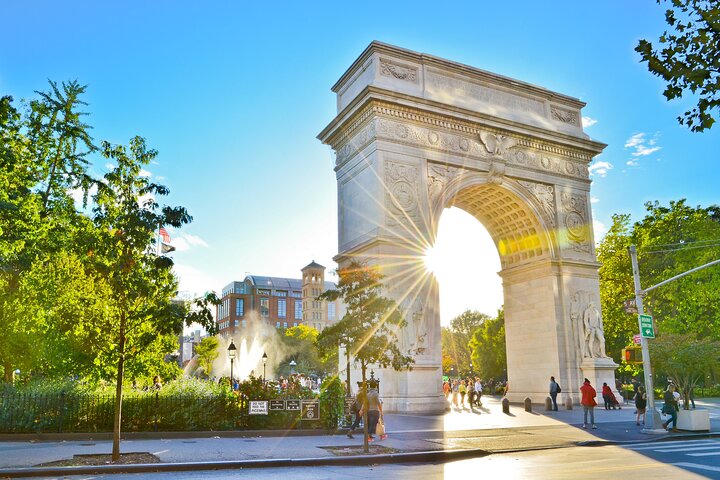Why choose this New York City tour ?
This tour is led by dynamic, local resident tour guides whose love for “our park” + engaging storytelling brings to life the history and charm of Central Park. Covering both well-known spots and hidden gem secret locations inside the park that you would never expect to experience. The thoughtfully engineered route offers a diverse, immersive experience, blending nature, architecture, history, and pop culture, while ensuring comfort and convenience with a pace that minimizes fatigue and concludes at a handy subway entrance for further city exploration. We will also reveal some other hidden gems to explore in and around Manhattan that only locals would know. Great restaurants, bars, entertainment spots that are a must see for anyone spending time in the greatest city in the world. Our local knowledge is incomparable and earned over lifetimes of being proud Manhattan residents. We will share all of it with you ❤️
Make the most of your New York City adventure
What makes Central Park 2hr Walking Tour led by expert Manhattan residents ! a unique experience ?
“The Serene Oasis” – Begin your tour at the Pond, the picturesque, man-made water body located at the southeastern corner of Central Park. Enjoy the peaceful environment, feed the ducks and swans, and don’t forget to photograph the stunning Gapstow Bridge spanning this tranquil spot.
The smallest of the Park’s three woodland landscapes, the Hallett Nature Sanctuary offers visitors an intimate experience of nature just steps from the busy streets of midtown. Rustic trails wind up and down the hill, leading to various overlooks and sitting areas near the shore of the Pond. Originally called “The Promontory” by the Park’s designers, the rocky hill was a prominent feature in the landscape, but without any walking paths it was not a place that visitors could explore. In the 1930s, it was fenced off and designated a bird sanctuary. In 1986, it was renamed in honor of George Hervey Hallett, Jr., an activist, nature enthusiast, and birder.
Wollman Rink
Expand
Ice Skating at Wollman Rink
Wollman Rink is a historic attraction and favorite event venue year-round.
Location: MAP | Enter at 59th Street and 5th or 6th Avenue
Contact: (833) 615-3500
Wollman Rink has been a favorite attraction for visitors since its opening in 1950.
In fall and winter, ice skating at the rink is one of the most popular things to do among New Yorkers and tourists alike. There’s nothing quite like gliding across the ice beneath a starry sky, while surrounded by the splendor of the Manhattan skyline!
And in the warmer months when the rink is not in use for skating, it gets transformed into NYC’s most iconic pickleball court location. With 14 new courts as part of a three-year collaboration with CityPickle which runs through 2026, Wollman Rink offers visitors a unique opportunity to participate in this popular sport!
About 250,000 people take a ride on the Central Park Carousel every year. The famous ride has been very popular since 1871 when the original attraction opened.
At first, the Carousel was not received positively; the park commissioners objected to having commercial enterprises in the park. However, since it was such a success there have been four different models on the site, each of which has served as a pastime in Central Park. A favorite of park-goers, the first Carousel remained in operation until 1924. It was powered by a mule and horse who walked in a hidden compartment underground below the attraction. The animals were trained to start and stop with a foot tap from the ride’s operator above ground.
The next two Carousels in the park were steam-powered and both destroyed by fire. In 1950, the Department of Parks and Recreation began to search for a replacement model, and they found one abandoned in an old trolley terminal in Brooklyn’s Coney Island.
The Dairy, a Victorian cottage designed by Calvert Vaux and built between 1869 and 1871, is at the heart of the Children’s District. As its name suggests, this charming structure was originally home to fresh milk and snacks for children and their caregivers. Families enjoyed refreshments under the Dairy’s loggia (open-air porch) and cool breezes from the nearby pond. The large rolling lawn in front of the Dairy provided a place for children to play.
The Dairy became Central Park’s first visitor center in 1979 and was one of the first Conservancy restoration projects in the early 1980s. At that time, the building’s historic and colorful loggia was restored, which had been removed in the mid-20th century.
This expansive 15-acre field holds a rich history and continues to be a cherished haven for visitors from all walks of life.
Originally known as the “Commons,” Sheep Meadow earned its current name during the 1860s when the park’s designers envisioned a pastoral landscape where sheep could roam freely. While the days of grazing sheep have long passed, the meadow still carries the essence of its agricultural origins, inviting visitors to bask in its serene beauty.
As you step onto the expanse, you’ll be greeted by a panoramic view of towering skyscrapers juxtaposed against the backdrop of nature. It’s a remarkable sight, blending the urban energy of New York City with the calming embrace of the great outdoors.
“The Walkway of American Elms” – Stroll through the straight, tree-lined walkway known as the Mall, famous for its Quadruple Row of American Elm trees. This promenade is a gathering place for artists, musicians, and performers, providing a cultural, lively atmosphere that truly represents New York’s diversity.
“The Heart of Central Park” – Discover Bethesda Terrace, a majestic two-tiered structure that houses the iconic Angel of Waters statue at the Bethesda Fountain. From the ornate carvings on the terrace to the breathtaking views of the lake, it offers a romantic and picturesque setting that’s perfect for relaxation and photography.
“The Romantic Landmark” – Walk across the Bow Bridge, Central Park’s most photographed and filmed cast-iron bridge, boasting a stunning view of the city skyline juxtaposed with the park’s serene foliage. Enjoy its Victorian charm and picturesque vistas, making it an ideal spot for romance and leisurely strolls.
The lush Central Park woodland, known as the Ramble, is composed of 38 acres of winding pathways between 73rd and 78th streets. Described by Frederick Law Olmsted as a “wild garden”, the Ramble’s maze of trails amidst its abundant flora and fauna contrasts spectacularly with the formality of nearby attractions, such as the Bethesda Terrace. The Ramble is often noted for its bird-watching opportunities, where birdwatchers can catch a glimpse of some of the approximately 230 species found in the woods. Visitors can stop to take a look at the Gill, the man-made stream that runs through the Ramble.
“The Enchanting Lookout” – Visit the whimsical Belvedere Castle, a mini castle perched atop Vista Rock, offering panoramic views of the Great Lawn, Turtle Pond, and the Ramble. Inside, it’s a nature observatory, where visitors can learn about the park’s wildlife and take part in bird-watching activities.
Located at the precise geographical center of Central Park is one of the most well-known lawns in the world: the Great Lawn. The 55-acre area hosts a great range of recreational activities and is a popular destination for picnicking, sunbathing, relaxing, playing and watching softball, and enjoying the scenery. The main oval lawn area is 12 acres and includes six fields for softball. (Heckscher Ballfields and the North Meadow are home to the Park’s other sports fields). All require a permit to play organized games. To the north of the main lawn are two additional fields for volleyball and basketball.
The Great Lawn is well-known as a place for concerts and performances, hosting the annual New York Philharmonic Concerts in the Parks performance and annual Global Citizen Festival. The Great Lawn landscape also includes important scenic destinations such as the Arthur Ross Pinetum and Turtle Pond.
Evocative of an English cottage garden, the four-acre space is densely planted with trees, shrubs, flowers, and herbs mentioned in William Shakespeare’s plays and poems. Scattered throughout the Garden are bronze plaques with quotes from Shakespeare that reference plants.
Shakespeare Garden is fittingly located near the Delacorte Theater, the venue for the Public Theater’s productions of Shakespeare in the Park. But the Garden predates the theater by several decades. A garden was first created on this site in 1912 by Dr. Edmond Bronk Southwick, NYC Parks’ entomologist, as a place for public school children to study plants and natural history, called “The Garden of the Heart.” Southwick, an avid Shakespeare fan, included four large planting beds with flowers found in Shakespeare’s literature, also intended as a teaching tool. The Garden became more focused on Shakespeare in 1916, in part because of celebrations of the tricentennial of Shakespeare’s death.
The American Museum of Natural History (AMNH) is a natural history museum on the Upper West Side of Manhattan in New York City. Located in Theodore Roosevelt Park, across the street from Central Park, the museum complex comprises 20 interconnected buildings housing 45 permanent exhibition halls, in addition to a planetarium and a library. The museum collections contain about 32 million specimens of plants, animals, fungi, fossils, minerals, rocks, meteorites, human remains, and human cultural artifacts, as well as specialized collections for frozen tissue and genomic and astrophysical data, of which only a small fraction can be displayed at any given time. The museum occupies more than 2,500,000 sq ft . AMNH has a full-time scientific staff of 225, sponsors over 120 special field expeditions each year and averages about five million visits annually.
The Central Park West Historic District is located along Central Park West, between 61st and 97th Streets, on the Upper West Side of Manhattan in New York City, United States. The district was added to the National Register of Historic Places on November 9, 1982. The district encompasses a portion of the Upper West Side-Central Park West Historic District as designated by the New York City Landmarks Preservation Commission, and contains a number of prominent New York City designated landmarks, including the Dakota, a National Historic Landmark. The buildings date from the late 19th century to the early 1940s and exhibit a variety of architectural styles. The majority of the district’s buildings are of neo-Italian Renaissance style, but Art Deco is a popular theme as well.
Tour Description & Additional Info:
- Service animals allowed
- Public transportation options are available nearby
- Not recommended for travelers with spinal injuries
- Not recommended for pregnant travelers
- Not recommended for travelers with poor cardiovascular health
- Travelers should have at least a moderate level of physical fitness
- Not reccomended for very young children or the elderly. Strollers & wheelchairs are not suitable for this tour.
Options To Choose for Your Trip:
Trending New York City Nearby Tours Likely To Sell Out
Special Instructions:
- This Tour is Provided by Central Park Touring Experience.
- Tour Timezone & Starts at America/New_York.
- Mobile or paper ticket accepted.
- For a full refund, cancel at least 24 hours before the scheduled departure time.
- This Tour is Rated 5 Stars based on 26 valid reviews on VIATOR.
- Minimum 1 Travelers is required to book.
- Maximum 10 Travelers is accepted for booking.
TBD









